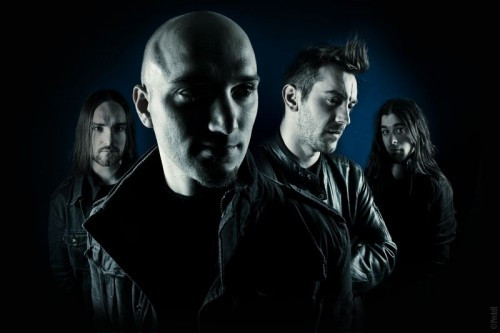
In this latest edition of The Synn Report, our UK contributor Andy Synn focuses on the music of Hacride.
France has given us so many great things. Art, architecture, literature… fine wine, beautiful women, pain au chocolat…. but more important than all of these things, France has given us some great metal over the years.
From the more well-known of today’s metal acts, like Gojira and Deathspell Omega, to lesser known (but no less stellar) bands like Scarve and Alcest, even through to newer, up-and-coming bands such as The Bridal Procession, the country has a rich and vibrant metal scene. Interestingly enough, though, the bands who have broken through to greater exposure often seem to have very little in common.
Prog-metal artistes Hacride are another great name to add to the list of internationally renowned French metal acts. Formed in 2001 the band have so far produced 3 albums of modernised, progressively structured, technically gifted, avant-garde death metal. Though the core elements of heavy, crushing guitars, weaving bass, pummelling drums and raw, over-wrought vocals are all very much present and correct, the songs themselves are put together in a much less standard and predictable fashion. Utilising an array of different additional instrumentation, along with prominent keyboards and synthesisers, the band carefully fashion long, epic songs juxtaposing moments of cool ambience with fiery polemic and vicious metallic clamouring.
DEVIANT CURRENT SIGNAL – 2005
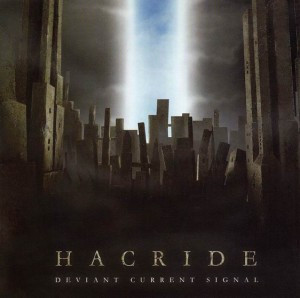 The simplest and most aggressive of all Hacride’s albums, their debut record begins with the raging torrent of bile that is “Human Monster”. Based around chugging, off-beat riffs and harsh, almost hardcore screams, the song is one of the most ferocious and primitive in the band’s history. On balance, however, the ringing background melodies and memorable vocals all help make the song far more listenable, as does a short but well-played solo near its conclusion.
The simplest and most aggressive of all Hacride’s albums, their debut record begins with the raging torrent of bile that is “Human Monster”. Based around chugging, off-beat riffs and harsh, almost hardcore screams, the song is one of the most ferocious and primitive in the band’s history. On balance, however, the ringing background melodies and memorable vocals all help make the song far more listenable, as does a short but well-played solo near its conclusion.
“Typo” is initially a more restrained affair, building layers of ringing guitar chords and keyboard melodies before introducing a tight, staccato riff interlude. The vocals vary between mid-range and a lower register whilst even the prominent thrash-beat based riffing is repeatedly twisted out of shape by sudden interludes of oddly timed guitar parts and the steady build up of dissonant, jagged layers of anti-melodic keyboards and choppy guitars.
Delving full-tilt into more overtly tech-metal territories, the furious riff onslaught of “The Place” also manages to incorporate crazed three-way guitar and bass tapping, without losing any of its intensity. The band’s soaring guitar melodies are prime for air-guitar glory, and even the more “brutal” riffs have a much catchier element to them, as do the repeated tapped patterns of contrasting guitar harmonies. The incorporation of almost Middle Eastern melodies into the song’s outro is a real surprise, and though they are eventually buried under another avalanche of tortured screams and pounding drums, their inclusion once again showcases the band’s willingness to experiment with different sonic textures. Subsequently the short palate cleansing instrumental “Polarity” bludgeons the listener into submission with some fierce guitar and locked-down drumming, backed up by warped keyboard passages which create a coldly mechanical and unsettling atmosphere.
The dissonant segue into “Flesh Lives On” has barely faded by the time the band introduce another off-time, down-picked guitar pattern followed by a series of squealing, ascending guitar runs. More melodically inclined guitars rear their heads heading into the song’s mid-section, while the vocals transform into drawn out screams of inarticulate rage. The restrained use of early In Flames-esque guitar melodies puts the band in a similar space to underground US darlings Cormorant, whilst the almost linear structuring of the song and raw, primal vocal lines all remind one of mid-period Mastodon, albeit a more modernised variant on the US quartet’s primal caveman jams.
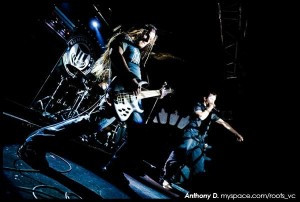 “Protect” brings to mind a more progressive variant of death metal, employing a rapid series of spiky harmonic riffs and unrelenting vocals. At around 2:00 a prominent keyboard line appears, adding a layer of off-putting atmospherics over propulsive riffs and drums. The crazed carnival atmospherics of the second half of the song are a rather abrupt change, leading into a saxophone-led section of ambient reflection which constantly twists and changes before the extended instrumental outro mixes clanging, metallic riffs with smooth leads guitars and the re-introduction of the cleverly played saxophone.
“Protect” brings to mind a more progressive variant of death metal, employing a rapid series of spiky harmonic riffs and unrelenting vocals. At around 2:00 a prominent keyboard line appears, adding a layer of off-putting atmospherics over propulsive riffs and drums. The crazed carnival atmospherics of the second half of the song are a rather abrupt change, leading into a saxophone-led section of ambient reflection which constantly twists and changes before the extended instrumental outro mixes clanging, metallic riffs with smooth leads guitars and the re-introduction of the cleverly played saxophone.
I would characterise this record as a wilfully difficult album; although often catchy and extremely head-bangable, the band often seem intent on not dwelling on any one idea too long and always keeping the listener guessing. Whilst this has the great effect of constantly surprising the listener with sudden shifts in direction and unexpected stylistic diversions, at this point in their career the band’s song-writing skills were not yet fully refined and some of the more abrupt changes come across as more jarring and jagged than were perhaps intended. Still, a stunning debut by a band clearly forcing themselves to think outside the box.
Sample song: Protect
AMOEBA – 2007
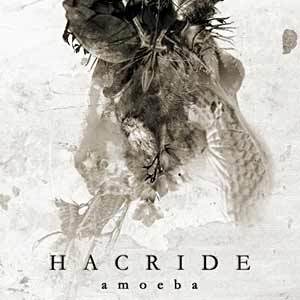 It swiftly becomes apparent, after only a few songs, that Hacride have taken some time to streamline and improve their writing process, balancing their delight in surprising the listener with unpredictable changes in style and direction with a modicum more taste and care, revealing less of the raw, jagged edges found on Deviant Current Signal.
It swiftly becomes apparent, after only a few songs, that Hacride have taken some time to streamline and improve their writing process, balancing their delight in surprising the listener with unpredictable changes in style and direction with a modicum more taste and care, revealing less of the raw, jagged edges found on Deviant Current Signal.
With “Perturbed” the band open with one of their most direct and confrontational tracks. The slow-build introduction is suddenly interrupted by massive, choppy riffing and raging vocals, whose post-Meshuggah stylings supply a heap of off-kilter aggression. Unsettling keyboard refrains weave in and out of the broken riffs, whilst the band also unleash some more melodic, semi-shredding moments of guitar intricacies to vary the song’s momentum, finally breaking down into shimmering, coruscating chord patterns and undulating bass-lines.
“Fate” opens with some great acoustic guitar whose distinctive rhythm is quickly overwhelmed by a squall of distorted, almost industrial, guitars. The verse riffs merge sharp, staccato picking patterns, high-pitched dissonant notes and pulsating bass-lines, whilst the drumming varies between punchy grooves and blast-beat ferocity. The middle of the song sees the band utilise a more sustained progression of silvery chords and meandering bass whilst the drums go almost free-form over the top. This leads to a further exploration of multiple instrument time changes and tapping, whose irresistible momentum leads towards a freak-out solo section, before the mountainous riffage causes the whole song to crumble beneath its own weight.
“Vision Of Hate” opens with a vicious thrash riff which abruptly descends into madness as the band dive headlong into a cavalcade of crazed, technical bass and stompy, dissonant guitar. Moments of the song really ratchet up the extremity, the drums blasting hell for leather while the guitars conjure up ghosts of their death metal past with relish, as well as periodically nodding towards their thrashier roots. The song employs semi-clean vocals and ethereal keyboard parts at unexpected moments, effortlessly weaving the musical tapestry into a singular, irresistible groove.
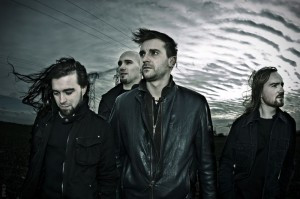 One of the most surprising songs on the disc, “Zambra”, is a cover of flamenco group Ojos De Brujo. Playing off the flamenco roots of the original against howling distorted guitars, the band juxtaposes clean female vocals with harsh screaming while fiery Latin rhythms provide a perfect foil for their chunky, metallic guitar work. The interplay of distorted and Spanish guitar work gives the song a great dynamic, allowing the distinctive melodies space to breathe whilst never losing that aggressive metal energy.
One of the most surprising songs on the disc, “Zambra”, is a cover of flamenco group Ojos De Brujo. Playing off the flamenco roots of the original against howling distorted guitars, the band juxtaposes clean female vocals with harsh screaming while fiery Latin rhythms provide a perfect foil for their chunky, metallic guitar work. The interplay of distorted and Spanish guitar work gives the song a great dynamic, allowing the distinctive melodies space to breathe whilst never losing that aggressive metal energy.
The subtle and flowing instrumental “Liquid” features abstract keyboard melodies washing over the listener while playful and intricately tapped guitars capture the attention. This is followed by the lurching density of “Cycle”, whose short, hypnotic riffs give way suddenly to ferocious blasting and discordant guitar work. The steamrollering pace of the song rarely slackens; save for occasional moments of ambient guitar and synth expression, the music maintains an unrelentingly aggressive demeanour, pounding beats and blasting drums dominating the brutal guitar work. At around 4:00 the song changes tack abruptly, ringing guitar chords and prominent bass work playing a jazz style bridge beneath which the drums explore elaborate fills and sophisticated patterns. The band change time signatures without warning throughout the song, managing to make the changes feel both natural and perplexing at the same time.
Switching seamlessly into “Deprived Of Soul”, the band rein in their more overtly technical aspects somewhat, as chugging open riffs dominate the proceedings whilst also exploring some more melodic textures. The bridge mixes some of the heaviest and lightest moments of the album together, repeatedly battering the listener with precision assaults of distorted guitar before switching to sweet, soothing acoustics.
Similarly direct, “Strength” employs a mechanical, punishing groove, whilst also utilising down-tempo, sludgy riffs to drag the atmosphere down into dirtier depths. The prominent, growling bass adds a real sense of nastiness to the proceedings whilst the extended acoustic mid-section serves as a beautiful moment of calm reflection.
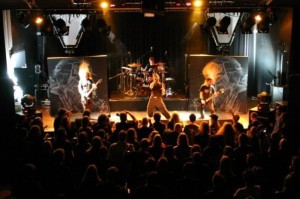 “Ultima Necat” is a multi-layered instrumental whose shiny, post-rock guitars meld with clean, prog acoustics and emotive keyboard-driven atmospherics to provide the perfect precursor to final track “On The Threshold Of Death”, the longest track on offer and amongst the most progressive.
“Ultima Necat” is a multi-layered instrumental whose shiny, post-rock guitars meld with clean, prog acoustics and emotive keyboard-driven atmospherics to provide the perfect precursor to final track “On The Threshold Of Death”, the longest track on offer and amongst the most progressive.
From a quiet, tranquil opening the guitars steadily grow in monolithic heaviness as the vocals vary between aggressive screaming and drawn out, semi-clean croons, leading towards a sudden interlude of calm, minimalist clean guitar, which allows listeners mere moments to catch their breath before the waves of crushing distortion come crashing back down. The progressive majesty of Tool can be heard throughout the song’s sophisticated use of hard riffs and clean breaks, and towards the end successive layers of harmonious keyboards and scintillating post-rock guitar work build towards an oppressive, incandescent conclusion.
This is an album with real depth. The use of disparate styles is no longer as jarring as on their debut, the band more skilfully incorporating the different elements into the creation of complex, individual musical arrangements. There is also a real sense of believable emotion present throughout the album, not just in the raw, passionate vocals but also in the intense, impassioned playing of each member.
Sample song: Fate
LAZARUS – 2009
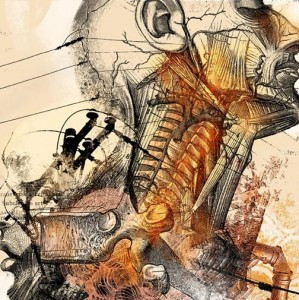 With “To Walk Among Them”, Hacride introduce their third album with a 15:03 piece of epic, soaring metal, taking the listener on a long and wandering journey through lumbering, mammoth rhythms, punishing staccato riffs, elephantine grooves and harsh, barked vocals. The massive, weighty sound is balanced out by subtle intricacies of writing and performance and the clever incorporation of memorable, clean vocal refrains. The more obvious post-Meshuggah-isms are utilised in a distinct and individual manner, broken up by looser, grooving parts and inscrutable atmospherics. The clear, metallic bass tone easily matches the guitars for power, adding another level of subtle appreciation, and the song concludes on an enigmatic, soaring refrain of restrained drums, shining guitars and dominating keyboard melodies.
With “To Walk Among Them”, Hacride introduce their third album with a 15:03 piece of epic, soaring metal, taking the listener on a long and wandering journey through lumbering, mammoth rhythms, punishing staccato riffs, elephantine grooves and harsh, barked vocals. The massive, weighty sound is balanced out by subtle intricacies of writing and performance and the clever incorporation of memorable, clean vocal refrains. The more obvious post-Meshuggah-isms are utilised in a distinct and individual manner, broken up by looser, grooving parts and inscrutable atmospherics. The clear, metallic bass tone easily matches the guitars for power, adding another level of subtle appreciation, and the song concludes on an enigmatic, soaring refrain of restrained drums, shining guitars and dominating keyboard melodies.
Appealing to fans of Gojira’s hulking grooves, “Act Of God” ducks and weaves like a prize fighter, the studied opening giving way to a short, frenzied mix of blasting drums and mercurial keyboards. The trance-inducing, circular riffs serve as an effective counterpoint to the more expansive chord arrangements and incisive interplay of harmonically linked guitar and melancholy keyboards.
The title-track “Lazarus” is another number of epic length and grand scale, opening with a delicate acoustic guitar before the weaving bass and abstract rhythms come into play. Steady, crunching riffs underpin the song, ably supported by echoing clean-picked guitar leads and a passionate vocal performance, mutating through numerous different forms before completion. The mid-point of the song is highlighted by subdued, almost tribalistic drumming, choked, frustrated vocals and esoteric synth lines, the enforced calm building anticipation for the inevitable explosion as lurching, elephantine riffs pile steadily on top of one another, crushing the listener with their sheer weight and heft.
Titanic instrumental piece “Phenomenon” displays a further nod towards the band’s progressive, post-metal tendencies, being a simmering, slow burning piece of majestic music which flows from an insistent semi-distorted guitar pattern, backed by minimalistic, ringing chords, into a huge Cult Of Luna styled piece of bleak, depressive post-metal.
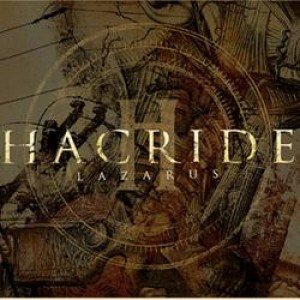 Its follow-up, the turbulent “A World Of Lies”, begins with a creeping, Tool-like introduction before erupting into rolling, lead-heavy riffing and impassioned, screamed vocals. The use of spoken-word vocals is a definite surprise, whilst the tom-heavy drum work continues to play upon the Tool comparisons. The end of the song is highlighted by a varied back and forth between fuzzy, oblique riffing and technical, tribal drum patterns.
Its follow-up, the turbulent “A World Of Lies”, begins with a creeping, Tool-like introduction before erupting into rolling, lead-heavy riffing and impassioned, screamed vocals. The use of spoken-word vocals is a definite surprise, whilst the tom-heavy drum work continues to play upon the Tool comparisons. The end of the song is highlighted by a varied back and forth between fuzzy, oblique riffing and technical, tribal drum patterns.
The skewed, twisted opening of “Awakening” puts one in mind of Pink Floyd as obtuse melodies and suicidal vocals mix uncomfortably with warped lead parts and twisting, undulating bass lines to create a hazy, disconcerting atmosphere. The surging, barely restrained metallic angst of the second half only serves only to increase the tense, nervous atmosphere of the song as the lead guitar squeals and rages with manic intensity and the drums tumble tumultuously in a raging torrent.
The dark, majestic opening of “My Enemy” is perfectly captured by the concordance of monolithic guitars and desolate keyboard refrains. The song mixes slower, sludgier tempos with faster, complex guitar breaks, whose complicated, convoluted arrangements challenge the listener to keep track. The screaming vocals have a distinctly mournful cast, and the solemn clean vocals are once more reminiscent of Pink Floyd, truly stretching to capture the sheer wealth of emotion on offer, whilst the drums also push themselves hard on this track, giving a truly mesmerizing performance.
The band harness their metallic might perfectly for the finale, recurrent syncopated drums and guitars driving the cast-iron heaviness of the song home, managing to be simultaneously abstract and obscure, yet brutally direct. The song enthrals one’s attention utterly before suddenly and without warning ending in mid-flow, leaving the listener lost and awaiting a resolution that will never come.
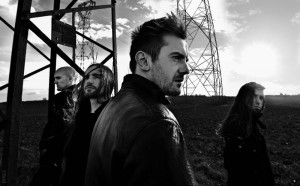 Arguably their best release yet, Lazarus captivates and confuses the listener in equal measure. More organic and natural than either of its predecessors the album does not sacrifice an ounce of originality or ferocity even though the band have clearly concentrated on constructing a more flowing, consistent sound. This time around the multiple different styles and changes in approach are less surprising, but more effective, due to their natural composition; at no point does it sound like the band have simply thrown disparate elements together for effect but have rather focussed on combining hitherto unlinked aspects of metal in a new and intriguing manner.
Arguably their best release yet, Lazarus captivates and confuses the listener in equal measure. More organic and natural than either of its predecessors the album does not sacrifice an ounce of originality or ferocity even though the band have clearly concentrated on constructing a more flowing, consistent sound. This time around the multiple different styles and changes in approach are less surprising, but more effective, due to their natural composition; at no point does it sound like the band have simply thrown disparate elements together for effect but have rather focussed on combining hitherto unlinked aspects of metal in a new and intriguing manner.
Recommended song: My Enemy
Recommended for fans of: Gojira, The Ocean, Mastodon

This is a great band. Zambra is actually my favorite song of theirs (Perturbed close second).
I only got a hold of “Deviant Current Signal” just before writing the piece, so I was already more familiar with the songs from “Amoeba” and “Lazarus”. Both great albums and “DCS” isn’t quite as good, but my God I think “Protect” may be one of my favourite songs by them. It justs works.
Only just downloaded it, as I was at work earlier, but you’ve got a point there. It works!
It’s got that thick cut-open Hacride freakiness. The audible, music-translated thoughts and ramblings of the mad man slipping into a trip.
Well-said!
You know, I like but cannot love this band. I’ve only heard “Lazarus,” but starting a record with a bloated 15-minute opener is a turn off, even if it is a tremendously admirable one. (This coming from an Opeth fanboy)
When i listen to the songs out of context, I like them,